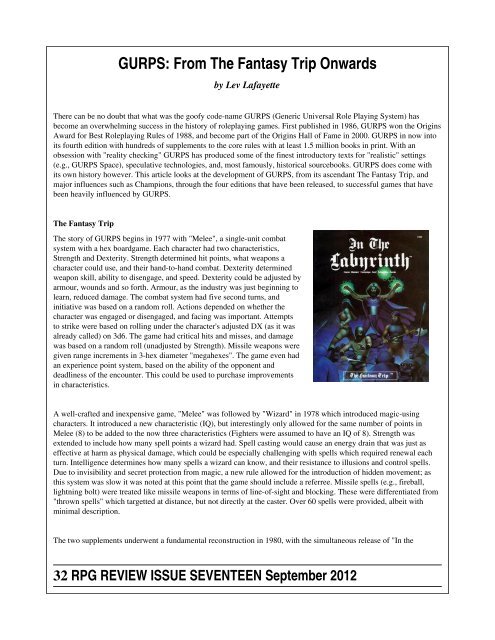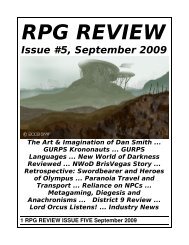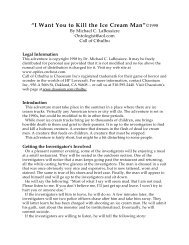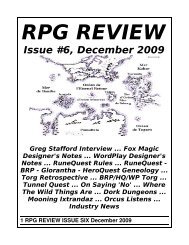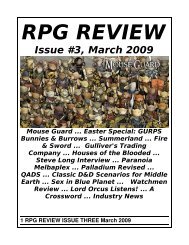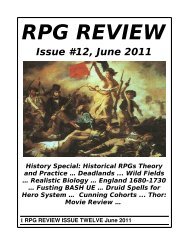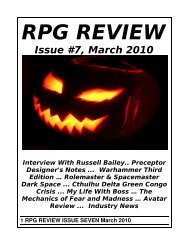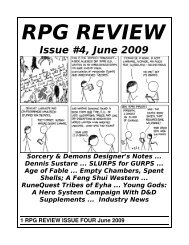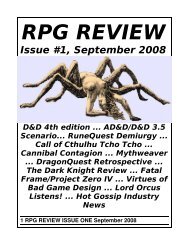seventeenth issue - RPG Review
seventeenth issue - RPG Review
seventeenth issue - RPG Review
Create successful ePaper yourself
Turn your PDF publications into a flip-book with our unique Google optimized e-Paper software.
GURPS: From The Fantasy Trip Onwards<br />
by Lev Lafayette<br />
There can be no doubt that what was the goofy codename GURPS (Generic Universal Role Playing System) has<br />
become an overwhelming success in the history of roleplaying games. First published in 1986, GURPS won the Origins<br />
Award for Best Roleplaying Rules of 1988, and become part of the Origins Hall of Fame in 2000. GURPS in now into<br />
its fourth edition with hundreds of supplements to the core rules with at least 1.5 million books in print. With an<br />
obsession with "reality checking" GURPS has produced some of the finest introductory texts for "realistic" settings<br />
(e.g., GURPS Space), speculative technologies, and, most famously, historical sourcebooks. GURPS does come with<br />
its own history however. This article looks at the development of GURPS, from its ascendant The Fantasy Trip, and<br />
major influences such as Champions, through the four editions that have been released, to successful games that have<br />
been heavily influenced by GURPS.<br />
The Fantasy Trip<br />
The story of GURPS begins in 1977 with "Melee", a singleunit combat<br />
system with a hex boardgame. Each character had two characteristics,<br />
Strength and Dexterity. Strength determined hit points, what weapons a<br />
character could use, and their handtohand combat. Dexterity determined<br />
weapon skill, ability to disengage, and speed. Dexterity could be adjusted by<br />
armour, wounds and so forth. Armour, as the industry was just beginning to<br />
learn, reduced damage. The combat system had five second turns, and<br />
initiative was based on a random roll. Actions depended on whether the<br />
character was engaged or disengaged, and facing was important. Attempts<br />
to strike were based on rolling under the character's adjusted DX (as it was<br />
already called) on 3d6. The game had critical hits and misses, and damage<br />
was based on a random roll (unadjusted by Strength). Missile weapons were<br />
given range increments in 3hex diameter "megahexes". The game even had<br />
an experience point system, based on the ability of the opponent and<br />
deadliness of the encounter. This could be used to purchase improvements<br />
in characteristics.<br />
A wellcrafted and inexpensive game, "Melee" was followed by "Wizard" in 1978 which introduced magicusing<br />
characters. It introduced a new characteristic (IQ), but interestingly only allowed for the same number of points in<br />
Melee (8) to be added to the now three characteristics (Fighters were assumed to have an IQ of 8). Strength was<br />
extended to include how many spell points a wizard had. Spell casting would cause an energy drain that was just as<br />
effective at harm as physical damage, which could be especially challenging with spells which required renewal each<br />
turn. Intelligence determines how many spells a wizard can know, and their resistance to illusions and control spells.<br />
Due to invisibility and secret protection from magic, a new rule allowed for the introduction of hidden movement; as<br />
this system was slow it was noted at this point that the game should include a referree. Missile spells (e.g., fireball,<br />
lightning bolt) were treated like missile weapons in terms of lineofsight and blocking. These were differentiated from<br />
"thrown spells" which targetted at distance, but not directly at the caster. Over 60 spells were provided, albeit with<br />
minimal description.<br />
The two supplements underwent a fundamental reconstruction in 1980, with the simultaneous release of "In the<br />
32 <strong>RPG</strong> REVIEW ISSUE SEVENTEEN September 2012


